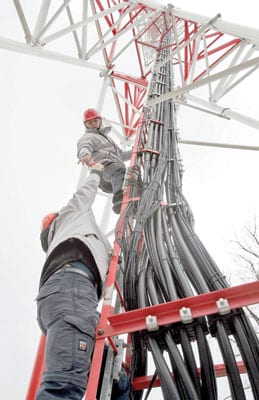After the structural changes over the last year that contributed to better organisation and efficient operations, this year Vip Mobile has put in focus further investment in network quality and the creation of new services.
As the largest greenfield investor in Serbia, with €927 million invested to date, Vip Mobile continues to invest in developing its own applications and digital services, as well as expanding the mobile signal and broadband internet in urban and rural areas, in order to cover more than 70 major cities and towns in Serbia with the 4G network and enable high-speed mobile internet for as much as 77% of the population of Serbia.
In 2015 you went through significant structural reforms. How will this impact your business this year?
During the last year, we have gone through structural changes within the Telekom Austria Group that involved the creation of organisational clusters “Serbia and Slovenia”, in order to achieve more efficient business organisation and the exchange of the best experiences between markets. In addition, during 2015 we have invested more than €77 million in our business, mainly in the development of the network and the introduction of 4G technology in Serbia.
Bearing all of this in mind, the current year is extremely important to us in terms of achieving results, but we are on the right track. During the first six months, we achieved revenue growth of nearly 12% and maintained a stable customer base and market share of 22.1%. Bearing in mind that we are still the biggest greenfield investor in Serbia, investing €927 million to date, I am satisfied that Vip continues the trend of sustainable growth at all levels.
Where do you see the answer to the strong competition in the market, primarily in the area of harmonisation of consumer expectations, the price of services and the sustainability of the business?
We are constantly expanding the mobile signal and broadband internet in urban and rural areas, which includes significant investment. As people in Serbia further optimise their mobile communication, we are facing the challenge of how to maintain revenue while responding to their needs and expectations.
As people in Serbia further optimise their mobile communication, we are facing the challenge of how to maintain revenue while responding to their needs and expectations.
The solution certainly lies in flexibility, innovation, an offer of useful services in collaboration with other industries, and the ability to react promptly to market changes. We have recently introduced a “Try and buy” concept, thanks to which users can, without any obligations and expenses, try the network and the services of a mobile operator before deciding to trust it. Vip is also the only operator to cancel call setup fee, while calls to the customer service are now also free of charge.
With this offer, we want to change the existing practice and encourage better market competitiveness. We have our own initiative and have consciously decided to abolish fees, which will certainly have a financial impact on our business. However, we are confident that we will, in the long run, retain existing customers this way, because they will be more satisfied, that we will attract many new customers who will recognise the benefits that one only gets with Vip.
Our successful cooperation with Orion Telecom and Societe Generale Bank are good indicators of how companies from different industries can pool their resources in order to offer customers complementary services that make life and business easier, and also save time and money
How far have your plans advanced concerning the implementation of 4G networks, and what are the factors that influence the pace of this work?
We recently set up an 800 LTE base station in Serbia, and our plan is for us to cover more than 70 towns and cities in Serbia, including smaller towns, with the 4G network by year’s end, which means that we will provide high-speed mobile internet for as much as 77 per cent of the population of Serbia.
By the end of the year, we will have the largest 4G network in the country. In addition, this year we completed a major project for the modernisation of our 2G and 3G networks. Users are offered an increasing number of diverse and integrated services as well.
What’s on your list of priorities until the end of 2016 and during the next year?
Our focus lies in further investment in network quality and new services. We will continue to develop our own applications and digital services but also remain open for cooperation with various industries and sectors. For example, our successful cooperation with Orion Telecom and Societe Generale Bank are good indicators of how companies from different industries can pool their resources in order to offer customers complimentary services that make life and business easier, and also save time and money.